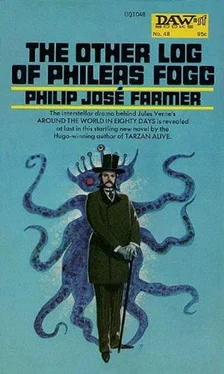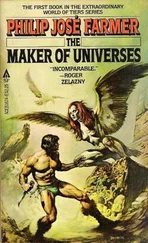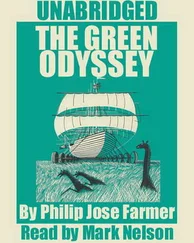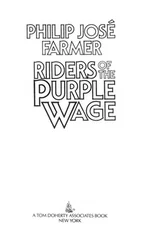Philip Farmer - The Other Log of Phileas Fogg
Здесь есть возможность читать онлайн «Philip Farmer - The Other Log of Phileas Fogg» весь текст электронной книги совершенно бесплатно (целиком полную версию без сокращений). В некоторых случаях можно слушать аудио, скачать через торрент в формате fb2 и присутствует краткое содержание. Жанр: Фантастика и фэнтези, на английском языке. Описание произведения, (предисловие) а так же отзывы посетителей доступны на портале библиотеки ЛибКат.
- Название:The Other Log of Phileas Fogg
- Автор:
- Жанр:
- Год:неизвестен
- ISBN:нет данных
- Рейтинг книги:3 / 5. Голосов: 1
-
Избранное:Добавить в избранное
- Отзывы:
-
Ваша оценка:
- 60
- 1
- 2
- 3
- 4
- 5
The Other Log of Phileas Fogg: краткое содержание, описание и аннотация
Предлагаем к чтению аннотацию, описание, краткое содержание или предисловие (зависит от того, что написал сам автор книги «The Other Log of Phileas Fogg»). Если вы не нашли необходимую информацию о книге — напишите в комментариях, мы постараемся отыскать её.
The Other Log of Phileas Fogg — читать онлайн бесплатно полную книгу (весь текст) целиком
Ниже представлен текст книги, разбитый по страницам. Система сохранения места последней прочитанной страницы, позволяет с удобством читать онлайн бесплатно книгу «The Other Log of Phileas Fogg», без необходимости каждый раз заново искать на чём Вы остановились. Поставьте закладку, и сможете в любой момент перейти на страницу, на которой закончили чтение.
Интервал:
Закладка:
On the seventh of December, the train halted for fifteen minutes at the Green River Station in the Wyoming Territory. Several passengers got off to unlimber their legs. Aouda, looking through the window, became alarmed. She had seen Colonel Stamp Proctor on the platform.
Verne says that it was only chance which brought Proctor on the train, but we know better. Verne also says that Fix, Aouda, and Passepartout conspired to keep Fogg from learning that the colonel was a passenger on another car. This was one of Verne’s novelistic insertions. Aouda, in fact, woke Fogg up to tell him about Proctor.
Fogg merely asked if Aouda and Fix could play whist, and they were soon playing.
Aouda, using the cards as code transmitters, asked Fogg what he intended to do about Proctor. Fogg replied, “Nothing-for the moment.”
“Why not, if I may ask?”
“The time and place are not appropriate.”
The train soon bore them over the Rockies through snow. Some distance past Fort Halleck, the train unexpectedly stopped. The alarmed passengers, with the exception of Fogg, poured out. They discovered the engineer and conductor talking to a signalman. He had been sent from Medicine Bow, the next stopping place, to halt the train. A suspension bridge over some rapids was in too ruinous a condition for the train to chance crossing it.
An American, Forster, proposed that the train back up so it could get a running start. If it gained enough speed, it would practically jump over the bridge.
After some hesitation, the passengers, with one exception, agreed. Passepartout, using the logic that distinguishes the true Gaul, asked why the passengers did not walk over the bridge? Why ride on the train, which might be precipitated into the abyss?
He was overruled by all and so rode trembling while the train, going a hundred miles an hour, shot across the perilous stretch. No sooner had the rear wheels of the rear car passed onto land than the bridge, with a great noise, fell into the chasm.
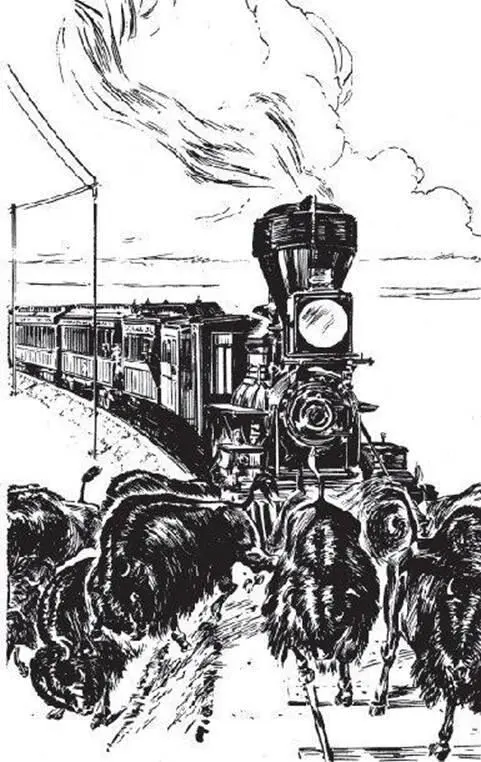
Passepartout, wiping his brow, thought that there must be something in the air of this continent that made all its inhabitants mad.
The whist game was resumed. When the train was in Nebraska, a voice familiar to three of the players spoke behind them.
“I should play a diamond!”
It was Proctor, who pretended that he had not recognized the Englishman until that moment.
“Ah, it’s you, the limey? It’s you who’re going to play a spade?”
“And who does play it,” Fogg said, throwing down the ten of spades.
“Well, it pleases me to have it be diamonds,” Proctor said. He reached out as if to grab the card, saying, “You don’t know anything about whist.”
“Perhaps I do, as well as another,” Fogg said as he got to his feet.
Fix also rose. He said, “You forget that it is I whom you have to deal with, sir. It is I whom you not only insulted but struck.”
Fogg understood what Stamp was doing. He would try to kill Fogg openly in a duel of honor. These were not uncommon in the territories, but Nebraska had been admitted as a state on the first of March, 1867. Did the state forbid duels and enforce the law with harsh penalties? It did not matter. Proctor did not seem to think that legal retribution would follow. Indeed, he was doing exactly what Fogg had expected. That was why Fogg had endured Proctor’s insults and had forced him to come to him. If Fogg won and was then arrested, he could plead that he was not the aggressor.
“Pardon me, Mr. Fix,” Fogg said. “This is my affair alone.”
The colonel said, indifferently, that the time, place, and weapons were up to Fogg.
Out on the platform, however, Fogg did try to talk Proctor into a delay. Proctor sneeringly refused and intimated that Fogg was a coward who, once safe in England, would never dare return. Seeing that the colonel was set on having the duel now, and that he had plenty of witnesses to prove that he had tried to put off the affair, Fogg agreed to exchange shots at the next stop. Unflustered, he returned to his car. Aouda tried to talk him out of it but without success. Fogg asked Fix if he would be his second. Fix replied that he would be honored. Passepartout understood that this request was one more test of the detective.
A little past eleven in the morning, the train stopped at Plum Creek. Fogg got off, only to be told that the train could not delay more than a minute. It was twenty minutes behind schedule, and the time must be made up. Fogg got back on. The conductor then approached the two participants with the suggestion that they fight in transit.
Fogg and the colonel agreed. The duelists, their seconds, and the conductor walked to the rear car. There the conductor asked the dozen or so passengers if they would leave until the two gentlemen concluded their argument. They left, happy at some excitement relieving the tedium.
The car was fifty feet long. Fogg stood at one end; Proctor, at the other. Each held two six-shooter revolvers. The conductor left, and the two seconds closed the doors of the car. After the engineer blew the whistle of the locomotive, the two would advance toward each other, firing as they wished.
Before Fogg and Proctor could start shooting, the train was attacked by about a hundred mounted Sioux. The two duelists were the first to fire against the Indians; they agreed without a word spoken to each other to put off the duel until this peril was over. If they survived this attack, they could resume their quarrel.
As many may remember from Verne’s account, some Sioux boarded the engine and stunned the engineer and fireman. The chief of the Indians, trying to stop the train, opened instead of closed the steam valve. The train was soon roaring along at one hundred miles per hour. This made it vital that the passengers somehow stop the train at Fort Kearney. If the train went on past it for any distance, the Sioux would have time to overwhelm the passengers. Many of the Indians were aboard it now, shooting and battling hand to hand with their enemies, who were indeed palefaces at this time.
Passepartout had been frightened at the illogic of the others when they rode the train across the ruined bridge. But when logic demanded action, he cast aside his fears. Logic now required that the train be stopped in time. Bravely and expertly, since he was an acrobat, he crawled under the cars on their chains and axles. He loosened the safety chains between the baggage car and the tender, and a violent jolt drew the yoking bar out. The locomotive and coal tender soon passed out of sight while the cars rolled to a stop. The troops from Fort Kearney attacked, and the Indians fled. Unfortunately, Passepartout was carried away on the tender.
Aouda, who had coolly shot a number of Sioux, was untouched. Fogg was also unwounded. Fix had a slight wound in his arm. Colonel Proctor had not been so lucky. He had received a ball in his groin which had not only incapacitated him but might result in his death. Through his pain, he glared at Fogg, who coolly stared and then turned away.
Verne assumed that it was a Sioux bullet which had struck Proctor. Fogg records that it was he who put the colonel out of action. As soon as he saw that they would be safe, he had shot the colonel. He would have put the bullet in the man’s head if he had been absolutely certain that he was a Capellean. In any event, he wanted to make sure that he would not be delayed.
As it turned out, he was held up anyway. On being informed that Passepartout and several other passengers had been carried off, he determined to go after them. This meant that the train would leave without him and that he would probably not catch his steamer at New York. He did not hesitate. He could not desert the brave Frenchman, knowing that he would be horribly tortured by the savages. He shamed the captain of the troopers into getting thirty volunteers to accompany him on a rescue expedition. That Fogg offered five thousand dollars to be split among the troopers may have had something to do with their willingness to face the Sioux. And that Passepartout was carrying the distorter may have had something to do with Fogg’s insistence on going after him. However, in view of his character, it would be well to dismiss this unworthy thought.
Читать дальшеИнтервал:
Закладка:
Похожие книги на «The Other Log of Phileas Fogg»
Представляем Вашему вниманию похожие книги на «The Other Log of Phileas Fogg» списком для выбора. Мы отобрали схожую по названию и смыслу литературу в надежде предоставить читателям больше вариантов отыскать новые, интересные, ещё непрочитанные произведения.
Обсуждение, отзывы о книге «The Other Log of Phileas Fogg» и просто собственные мнения читателей. Оставьте ваши комментарии, напишите, что Вы думаете о произведении, его смысле или главных героях. Укажите что конкретно понравилось, а что нет, и почему Вы так считаете.
